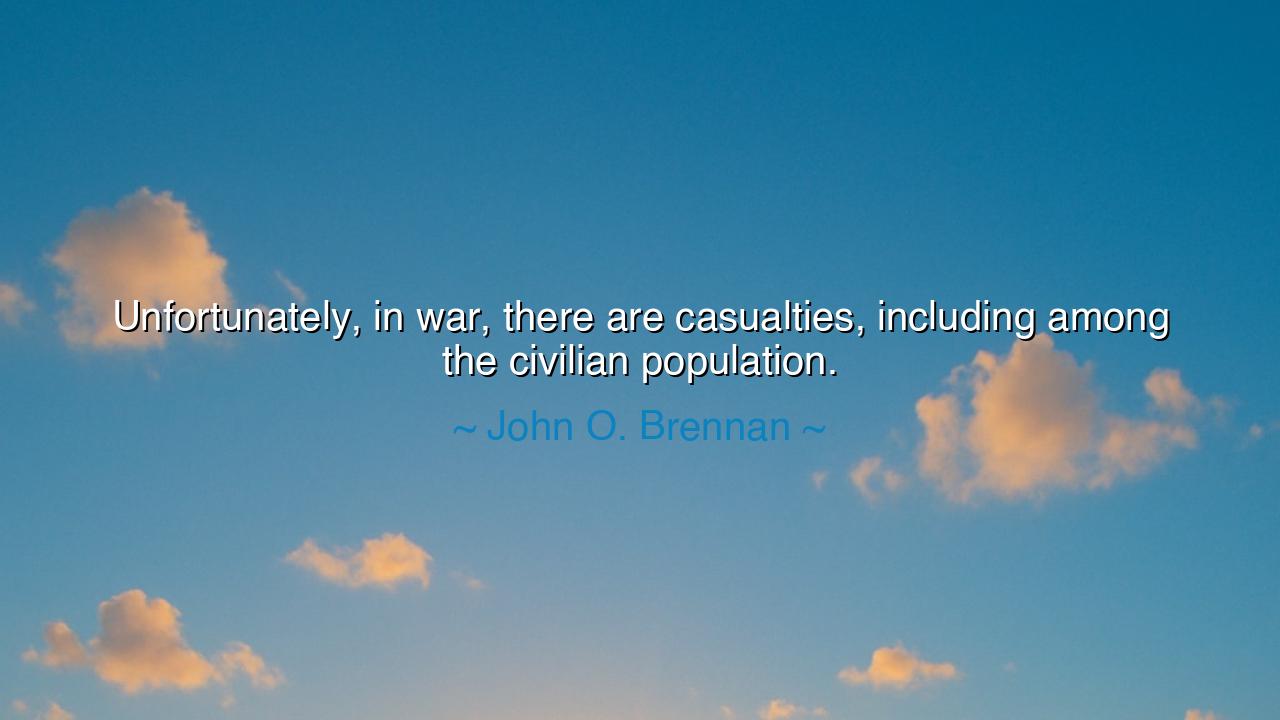
Unfortunately, in war, there are casualties, including among the






The somber words of John O. Brennan, once the guardian of America’s intelligence, echo with a truth as old as the clash of armies: “Unfortunately, in war, there are casualties, including among the civilian population.” This is no lofty proclamation of glory, but a reminder of the cruel price that every conflict demands. For though leaders speak of strategy and soldiers march with banners, it is often the innocent—the farmer, the mother, the child—who bear the heaviest burden of war’s fury.
To call them casualties is to use the language of policy, yet behind the word stand countless faces, each a life once filled with hope and dreams. In every war, bombs fall not only on fortresses but on homes; hunger stalks not only the battlefield but the villages beyond. The ancient poets knew this truth well: Homer sang of warriors, but he also told of wives left widowed, of children waiting for fathers who would never return. Brennan’s words, though spoken in the modern age, echo this eternal sorrow—that the sword never strikes clean, but always cuts the innocent as well.
History gives us many examples of this tragic reality. In World War II, entire cities were consumed by firestorms: Coventry, Dresden, Tokyo. The bombs did not discriminate between soldier and schoolchild, between general and grandmother. The nuclear destruction of Hiroshima and Nagasaki ended the war, but at the price of tens of thousands of civilian lives in a single instant. These were not warriors on the field, but ordinary people caught in the storm. Thus, every age proves Brennan’s saying true: in war, the civilian population cannot be spared entirely, no matter what care is taken.
This reality has followed humanity even into the modern era of precision weapons and intelligence-driven strikes. Drones, missiles, and advanced systems promise accuracy, yet still civilians fall. A miscalculation, a flawed report, a target hidden among homes—these are enough to turn intent into tragedy. And so Brennan’s words are not an excuse, but an acknowledgment: technology cannot erase the fundamental cruelty of war. Wherever conflict rages, the innocent are drawn into its fire.
Yet wisdom demands we do more than acknowledge tragedy—we must learn from it. The ancients counseled that the greatest general is not the one who wins many battles, but the one who prevents battles altogether. For if every campaign brings with it casualties among the helpless, then true victory lies not in the defeat of the enemy but in the preservation of peace. Brennan’s reminder should not harden our hearts but sharpen our resolve to avoid war wherever possible, lest the cost be borne by those who never chose to fight.
The lesson for us is both personal and collective. In our own lives, we may not command armies, but we do wage smaller battles—arguments, rivalries, resentments. And in these conflicts, too, there are “civilians”: those who are hurt not by choice but by proximity—family members, colleagues, friends. When we choose strife, they often suffer. Thus, Brennan’s truth reaches even into our daily lives: beware of the collateral damage your battles may inflict.
Therefore, let this wisdom be carried forward: honor the weight of war, never speak of it lightly, and remember always the faces hidden behind the word casualties. Work for peace in the councils of nations and in the chambers of your own heart. And when conflict cannot be avoided, fight with restraint, mercy, and a vision for healing. For though Brennan’s words remind us of war’s cruelty, they also summon us to the higher path—to labor ceaselessly for the day when fewer innocents must pay the price of mankind’s quarrels.






LHthi linh Hoang
Brennan’s quote offers a somber reflection on the realities of war. The fact that civilians are always caught in the crossfire raises important ethical questions. Is the loss of innocent lives just an unfortunate inevitability, or is it a failure of strategy, leadership, and international diplomacy? How can we prevent the loss of life among civilians in future conflicts?
ANanh nguyen
John O. Brennan makes an essential point: civilians often face the brunt of the violence in war, whether directly through bombings or indirectly through the breakdown of society. How do we reconcile the idea of a 'just' war when innocent people suffer the most? Can military leaders and governments do better in protecting civilians in the midst of conflict, or is this just part of the inherent cruelty of war?
UGUser Google
This quote brings to light the hidden tragedy of war—the civilian victims. It’s easy to forget the cost of war when the focus is on military objectives, but the human cost cannot be ignored. Can modern warfare ever be truly ‘clean,’ or is the inevitable loss of civilian life something we will continue to accept as collateral damage?
NMNguyet Minh
Brennan's words echo a harsh truth about war. Even if conflicts are fought for strategic purposes or national security, the destruction of civilian lives cannot be justified. It’s unsettling to think about how much suffering is caused by decisions made in boardrooms and war rooms. Is there a way to stop wars before they begin, or are we bound to keep repeating this cycle of loss?
TTduong thanh tung
It’s difficult to ignore the tragic reality that civilians always bear the brunt of conflict. While military strategies may aim for tactical victories, the human cost, especially among civilians, is immense. This quote raises the question: What more can be done to safeguard non-combatants? Are we doing enough on the global stage to limit these casualties, or is it too late once the fighting begins?